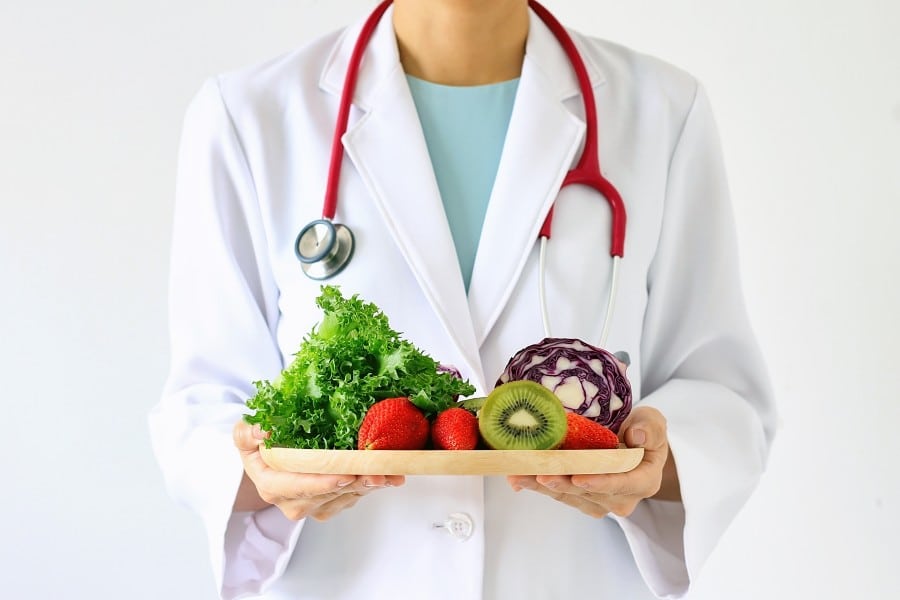Hyperthyroidism is a serious disease characterized by an excess of thyroid hormones that requires a serious medical diagnosis. Hyperthyroidism is usually treated with antithyroid drugs or with surgery. However, a healthy diet can also improve your health and condition. Focus on the hyperthyroidism diet.
Hyperthyroidism : a brief definition
What is hyperthyroidism ?
What are the symptoms of hyperthyroidism ?
- An increased heart rate
- An excessive sweating
- Nervousness and anxiety
- Weight loss (weight gain in rare cases)
- Frequent bowel movements
- High blood pressure
- Amenorrhea
What causes hyperthyroidism ?
Hyperthyroidism is seven to eight times more prevalent in women than in men. The reason for this is still unknown.
The most common causes of hyperthyroidism are:
- Graves’ disease (an immune system disorder)
- Toxic multinodular goiter
- Thyroiditis
- A toxic nodule
In all cases, a dosage of thyroid stimulating hormone (TSH) and thyroid hormones is prescribed by the doctor to confirm the diagnosis.
What are the treatments for hyperthyroidism ?
Today, thyroid issues are really well treated. In the case of hyperthyroidism, the treatment of the disease depends on the cause.
The main treatment for hyperthyroidism remains drugs that reduce the production of thyroid hormones. Sometimes it is necessary to treat the symptoms as well.
Iodine is given as an emergency treatment. For the most serious cases, the thyroid gland has to be surgically removed, either partially or totally.
Hyperthyroidism : why is diet so important ?
Scientists do not all agree on the usefulness of a diet to regulate hyperthyroidism. However, they agree on the fact that certain nutrients such as minerals and vitamins are necessary to ensure the good functioning of the thyroid gland.
In the case of hyperthyroidism, a diet consisting of foods low in iodine is sometimes prescribed in addition to a drug treatment, according to the experts. Apart from iodine, whose role in the functioning of the thyroid is well known, other nutrients or foods also participate in the balance of thyroid function.
What foods to eat in case of hyperthyroidism ?
In case of hyperthyroidism, the best foods to eat according to the recommendations of Medical News Today are:
- Products that are low in iodine as they help reduce thyroid hormones (egg white, fresh fruit, oats, honey, etc.)
- Cruciferous vegetables that prevent the thyroid from using all the iodine available in the body (cabbage, broccoli, bamboo, arugula, etc.)
- iron-rich foods since low iron levels are associated with hyperthyroidism (red meat, dried beans, nuts, etc.)
- Foods rich in selenium as selenium helps balance thyroid hormones (Brazil nuts, chia seeds, mushrooms, oats, poultry, etc.)
- Foods rich in vitamin D and calcium that help protect the bones (salmon, almonds, prunes, white beans, dairy products in reasonable doses, etc.). Indeed, bones are often weakened in case of hyperthyroidism
What foods to avoid in case of hyperthyroidism ?
Some kinds of food seem to have an unfavorable action on hyperthyroidism. These foods should therefore be limited as much as possible :
- Foods rich in iodine that promote the production of thyroid hormones (sea fish, shellfish, seaweed, etc.)
- Foods that contain soy which seems to interfere with hyperthyroidism treatments (soy milk, soy sauce, tofu, etc.)
- Foods or drinks rich in caffeine which, through their stimulating action, exacerbates the symptoms of hyperthyroidism (coffee, black tea, dark chocolate, etc.)
Read also : Overview of diet-based approaches to managing Hashimoto’s disease
Hyperthyroidism : living a healthy lifestyle
- Get a good night’s sleep to compensate for the increased metabolism
- Avoid all stimulants that could worsen symptoms, including cardiac and cardiovascular symptoms of hyperthyroidism
- Do not take any vitamin supplements that contain iodine
- Do not take any food supplements containing tyrosine, an amino acid that is also a precursor to thyroid hormones
- Avoid practicing sport during periods of hyperthyroidism to avoid an increase of your metabolism. Indeed, during these periods, your body is already in hyperactivity
- Practice sport during periods of stabilization to prevent bone degeneration
- Avoid tobacco, which is harmful anyway
Good to know :
Hyperthyroidism is much less common than hypothyroidism.
Diet for hyperthyroidism prevents certain risks of complications.
Iodine is the nutrient to watch the most in the diet for hyperthyroidism.
Hyperthyroidism is a rare disease whose prevalence is around 1% of all thyroid issues. It is generally treated with medication. Studies have shown that a suitable diet can help manage and limit the risks of complications in case of hyperthyroidism. A balanced food intake and the control of your daily iodine consumption is at the basis of this diet.




